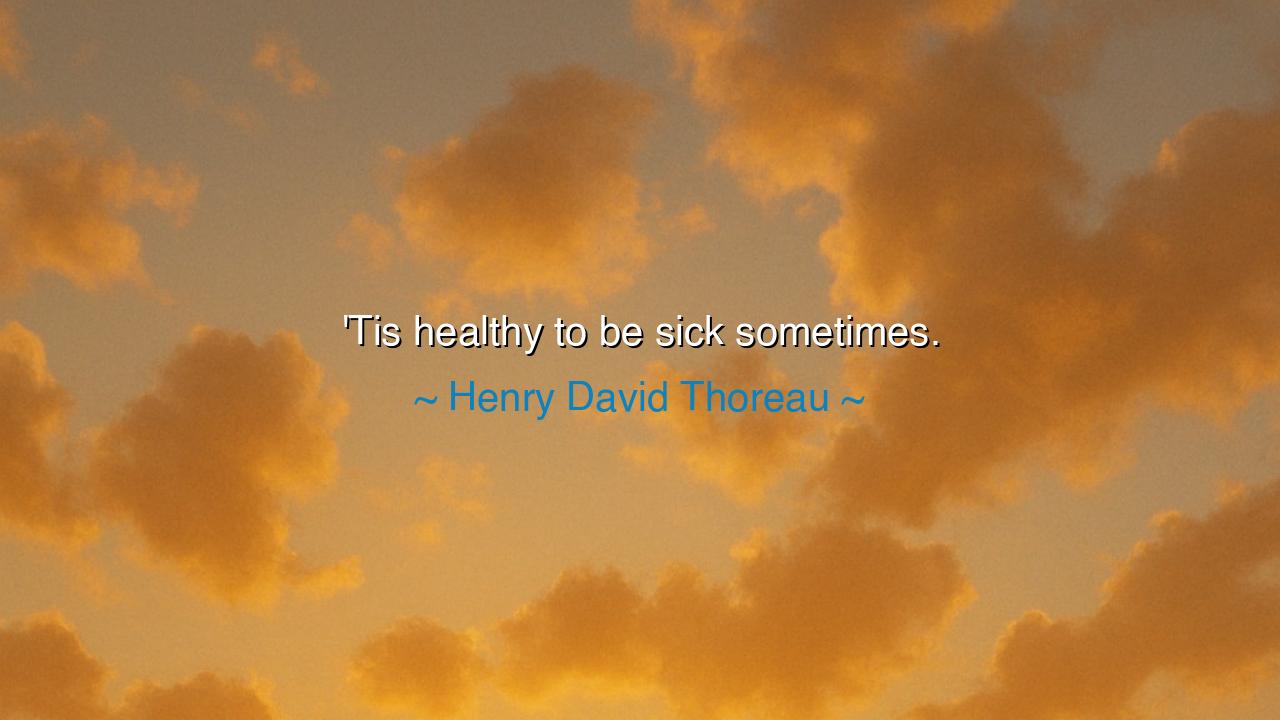
'Tis healthy to be sick sometimes.






In the quiet, contemplative wisdom of Henry David Thoreau, philosopher of solitude and seer of the soul, we find a paradox both humbling and profound: “’Tis healthy to be sick sometimes.” These words, delicate yet daring, turn the common view of illness upon its head. Where most see sickness as misfortune, Thoreau saw it as revelation — a moment when the body and the spirit speak truths that cannot be heard amid the noise of daily strength. In his cabin by Walden Pond, Thoreau learned that every weakness carries its own form of wisdom, and that even the shadowed hours of suffering can become a kind of healing.
To say that it is “healthy to be sick” is to acknowledge that adversity — even within the body — has the power to awaken and renew. When health is constant, we grow complacent; when vitality is abundant, we often forget gratitude. But when the body falters, when pain slows our pace and forces reflection, we are brought face to face with what truly matters. The body, fragile and mortal, becomes the teacher of humility. The soul, freed from the distractions of strength, begins to listen more deeply. Thoreau, ever the poet of introspection, believed that sickness strips away illusion — that through weakness, we rediscover both clarity and gratitude for the simple, sacred act of being alive.
The ancients, too, understood this truth. The Stoics taught that hardship is the forge of virtue, that illness can purify the mind as fire tempers steel. Epictetus, who himself was crippled by disease, said, “Do not seek to have events happen as you wish, but wish them to happen as they do, and your life will flow well.” Illness, in this view, is not an enemy but a messenger — a reminder of the delicate balance upon which life rests. Even in ancient China, the sages of Taoism saw sickness as the body’s way of restoring harmony when the natural rhythms of life were disturbed. In their wisdom, they did not curse illness, but listened to it — for in every fever, every ache, there lies the whisper of imbalance seeking restoration.
Thoreau’s own life bore witness to this philosophy. He was no stranger to frailty — plagued by tuberculosis, he often walked the fine line between life and death. Yet he did not retreat into despair. Instead, he found in his illness a kind of awakening. It was during his periods of weakness that he wrote most deeply of the eternal — of nature, simplicity, and the soul’s communion with the infinite. His body may have faltered, but his spirit soared. His sickness became a form of sight — the clarity that comes when all distractions fall away, leaving only truth. In this sense, Thoreau teaches us that even the moments of greatest limitation can open the doors of transcendence.
Consider the life of Frida Kahlo, the artist whose body was wracked with pain after a terrible accident. For years she was bedridden, her body broken — yet it was from that very suffering that her art was born. Her canvases, vibrant and unflinching, revealed not weakness, but the raw vitality of the human spirit. Through pain, she discovered the infinite depth of expression. Through sickness, she found her truest health — the wholeness that comes from accepting the self in all its imperfection. Like Thoreau, she transformed suffering into creation, proving that pain can be both the wound and the brush that paints the masterpiece of the soul.
Thus, Thoreau’s paradox stands revealed: sickness is not always destruction, but often renewal. The body’s breaking can lead to the spirit’s mending. To fall ill is to pause, to listen, to reset the course of life. When the body slows, the mind is forced to see what was long ignored — the clutter of busyness, the vanity of strength, the fleeting nature of time. Illness humbles us, teaches us patience, and draws forth compassion. The one who has suffered learns tenderness; the one who has healed learns gratitude. The heart that has endured pain becomes a gentler vessel for love.
Let this teaching, then, be carried as wisdom for the ages: do not curse the moments of sickness or sorrow, for they are also part of the great rhythm of being. When the body falters, tend it with care, but listen also to what it reveals. Ask: what truth is this pain trying to show me? What change does this stillness demand? Learn to rest, to breathe, to forgive yourself for slowing down. Know that wellness is not only found in movement and vigor, but in stillness and surrender.
So, as Henry David Thoreau reminds us, “’Tis healthy to be sick sometimes.” For in sickness, we remember our humanity. In weakness, we discover our resilience. And in healing, we rediscover the wonder of life — the taste of air, the warmth of sunlight, the quiet strength of the beating heart. To fall ill is not to fall behind; it is to fall inward — into the sacred space where true health, the health of the soul, begins anew.






AAdministratorAdministrator
Welcome, honored guests. Please leave a comment, we will respond soon